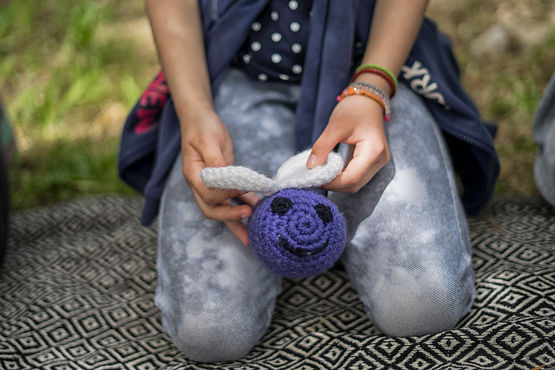EDUCATION
We believe that education is the best way to create social and environmental change. Only by educating the next generation, inspiring respect and love for nature, will we ever be able to hope for a more sustainable future for all of us.
Starting from the little things, like the bees, we talk about the ...big things!
POLLEN GO ROUND
Experiential workshop
Primary school
Duration: 45' or 90'

What is the relation between a bee and a glass of orange juice? Can there be any almonds without the bees?
What does life in a beehive look like?
We invite you to become bees for a day. To participate in the most exciting pollinator’s journey. And to discover the amazing world of honeybees.
-------------
Key-words: bee #beehive #roles of bees #pollination #hands-on #bee costumes #seedbombs
BEE IN THE CITY
Puppet pay
Kindergarten
Duration: 45'

The most famous bee, Soula the honeybee, will narrate her story. How she lost the way back to her home and she found herself in a place with no flowers…
She invites us to travel with her through sensory activities and to search for the secret recipe for the unique seedbombs, the little balls made out of clay, soil and bee-friendly seed, that can help save her and the rest of the planet.
Can we make it?
-------------
Key-words: #life in the beehive #bees #city #flowers #pollination #puppets #seedbombs #bee costumes
WHEN BEES EXISTED
Hand-on workshop
Middle school, high school
Duration: 90'

The bee population is declining on a global scale.
Why is that?
What do humans have to do with it?
What will actually happen if bees cease to exist?
Through a hands-on workshop we seek to realize the problem, the cause and the consequences, while trying to come up with possible solutions.
-------------------
Key-words: #decline of bee population #climate change #pollination #food security #solution #imagination #team work #collaboration #critical thinking #collage #seedbombs
BEE AGENTS
Big scale board game
Primary school
Duration: 60'

How many bee species are there in the world?
Where do all these bees live?
Do they all look alike?
Through a big scale board game we will discover the world of the solitary bees. Bees that don’t produce honey, don’t live in a beehive and don’ t have black and yellow stripes.
And what do they do?
Nothing more than being the most important organisms of the ecosystem.
The participants follow the life of solitary bees and discover their habits, recognise their needs and the challenges they face when they visit the urban scape.
In the end they will be trained bee agents and will receive their agend id.
----------------------
Key-words: #solitary bees #biodiversity #co-dependence #symbiosis #urban bees #bee agent id
WHO PUT THE LEMONS ON THE TREES?
Hands-on workshop
Primary School
Duration: 45’

What does a tree and a tee tree have in common?
Do plants have eyes?
Why do flowers exist?
Through a hands-on workshop we will discover the secret life of plants. We will observe with microscopes, we will learn about the circle of life of yearly plants and we will plant bee friendly seeds in order to turn every balcony into a tasty corner for the city bees.
-------------------
Key-words: #plants # microscopes #circle of life #bees #planting #flowers
THE MYSTERY OF THE ALMOND TREE
Interactive storytelling
Kindergarten, Primary School (1st & 2nd grade)
Duration: 45’

A blossom on an almond tree dreams of becoming an almond another one wonders why there is pollen in between its petals.
And a young bee will accidentally participate in solving this mystery...
Through the interactive storytelling, we will discover the secrets of pollination, the relation between fruits, flowers and the bees.
The storytelling is followed by interactive activities.
-------------------
Key-words: #pollination #storytelling #bees #nature #interactive narration #handcraft






















